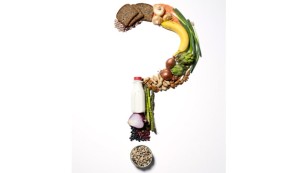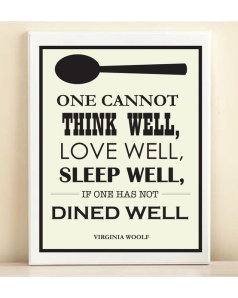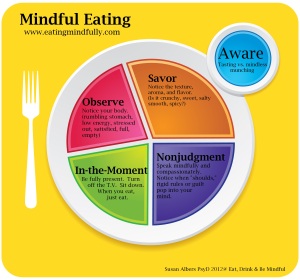And here it is, my final post of this entire project. What a year it’s been! I recently read back on the “About” and “The Beginning” posts that I wrote over a year ago in order to re-familiarize myself with the reasons why I embarked on this journey to begin with. What I learned from reading those posts is that my posts have gotten A LOT longer over the year (sorry about that) and that most of my goals for the year were achieved. I had wanted to learn what it was like to follow a regimented diet, to learn new cooking techniques, to be able to answer questions about popular diets, and to improve my will power. I would say I wasn’t a total success on the will power portion, but I also realized, through a year of “failing” on the will power game, that it’s not a battle that should even be fought. More on that in a minute, but first, my “awards” for this year.
The Dow Diet Awards
These are obviously just based on my opinion, except the “Most Expensive” award. That one is based on cold hard facts as witnessed by depletion of my bank account.
- Most Hated: Winner – Fast Metabolism Diet. Runner Up – Paleo
- Most Forgettable: Low Fat
- Best for Weight Loss: Although I didn’t really lose any weight on any of those (remember: that was my goal), the ones I would recommend would be 1) Volumetrics Diet and 2) Weight Watchers
- Most Expensive: Sustainability
- Enhancing the Culinary Prowess: Mediterranean, Vegan
- I Can’t Wait to Quit You: Paleo, Low Fat, Fast Metabolism Diet
- Favorite: Too tough to choose just one. Three-way tie between Vegan, Mediterranean, and Mindful Eating.
My Dietary Recommendations for Health and Happiness, in a very specific order
- Eat mindfully- Taste your food, free from distraction. Cook it and savor it with all of your senses. It will work miracles on your relationship with food, and is by far the best thing you can do for yourself.
- Cook your food – Here is a video narrated by Michael Pollan, which really hammers home the importance of cooking your own food. This doesn’t mean “preparing” a meal, i.e. a box of macaroni and cheese. It means actually cooking from scratch. When you do that, you don’t have to worry so much about the fat, carb, and protein content of your food. It’s just nourishment at that point, and it will balance itself out over time.
- Don’t be a dick about it – It’s hard to put this at #3 because I want to put it at #1, but the other ones are probably more important. I’ve always just rolled my eyes and been annoyed when people are super pretentious about their food, but these feelings were strengthened this year by trying all these different eating approaches and also by moving to Boulder, CO (the most uppity place I’ve ever experienced). My friends back in Tucson have something called the “In-N-Out and Casa Molina” test for people. If you aren’t willing to ever eat a tasty cheeseburger and some delicious, greasy, unhealthy Mexican food, there may be a larger underlying issue. If you disagree with this statement, you’re probably that pretentious person I’m referring to. Stop being a dick about it.
- Eat more produce – Everyone could stand to eat more fruits and vegetables. Incorporate them into more and more of your meals until you eat them constantly and start to crave them. Then, get creative, try new ones, and try preparing them in different ways. The possibilities are endless.
- Whatever approach you use if you’re trying to lose weight, choose one that can be maintained long term – At the end of the day, all of the diet trials and myriad of studies that have been performed ultimately lead to the same conclusion: the diet that works best for weight loss is the one that you can maintain. Try out different ones to see what works for you, and don’t get discouraged when the first thing you try doesn’t work for you, but it worked for your cooler, hotter, sister who everyone likes more and who has never struggled with anything. It’s so unfair! We’re all individuals. There is no one-size-fits-all approach to weight loss.
- Don’t drink the Kool-Aid – Literally, but also figuratively. If it sounds too good to be true, it is.
- Stop freaking out about it – It’s not nearly as complicated as the media and all the snake oil salesmen want to convince you it is.
What I Learned
As I previously mentioned, I really struggled this year with will power, until I realized that there is no point to will power if there isn’t a larger goal in mind. One of the most important lessons I learned this year is that curiosity is only a good short-term motivator. I struggled nearly every month to stay on track with the allotted dietary pattern because I would either lose sight of why I was doing this or, when I would remind myself of the goals listed above, they didn’t seem like good enough reasons. This was particularly true in months like Paleo and Fast Metabolism Diet when I had never felt hungrier and that transcended into some mental and emotional imbalance. Those months were the only time that I ever got a glimpse into what it’s like to be on a diet. One of my goals was to attempt to understand the psyche of a person undergoing a diet (thanks to those two aforementioned diets, I succeeded in that goal), but also to understand why people put themselves through the torture of a diet. I never got to the place where I understood that, and that comes back to the curiosity thing. Curiosity was my motivator, but the need to feel normal when you feel terrible trumps curiosity. I imagine a person with a dire health concern or a need for weight loss has a different motivation, and that’s something that I can’t relate to at this point in my life. Maybe if I ever need to change something about my lifestyle I’ll be able to relate to that issue more, and I’ll see the need for will power. But right now, I think will power is a silly thing to get caught up on, and I think it’s an issue that prevents people from reaching their health goals.
So here is a larger spiel on will power, and I realize as I’m writing this, that these ideas are not something I’ve ever been taught in any nutrition or health class. They go against many of the recommendations that students are taught regarding diet counseling. But here it goes.
The most important lesson I learned this year involves the concept of moderation. I know, you’ve heard it a million times before – everything in moderation. And maybe you’ve decided that moderation doesn’t work for you because you haven’t found that grasp on it – it’s either gorge yourself or go without, and if you are working on losing weight, the “correct” option is to go without. I really REALLY learned the fault in that kind of logic this year (the caveat to this, of course, is people with addictive behaviors or personalities, which I can’t really comment on because I don’t have any kind of extensive knowledge or training in that area). I’ll use the example again of FMD. That was truly a “go without” month for me, and I HATED it. Not only did I feel physically unhealthy, but I felt mentally unhealthy. And there’s the crux of it all. Physical and mental health are so intertwined that they can’t and shouldn’t be separated, though our current system attempts and is often successful at convincing us that they should be. Typically things that are good for your mental health are good for your physical health, so focus on that. You will never see the full benefit of a healthy lifestyle approach if you only focus on the physical health aspect of it. This whole time I’ve thought that my will power issues could be rectified by taking away the stimulus. This is the basis of nearly every fad diet and every dietary recommendation. “Don’t keep chocolate in the house so you won’t be tempted.” “Snack on fruits – it will feed your sweet tooth.” I call bullshit on all of that. While this may lead to weight loss, it doesn’t do a whole lot for your mental health because you a) feel deprived and b) never learn how to have a healthy relationship with these foods that you consider unhealthy/evil. And what is the point of physical health if mental health isn’t riding shotgun? I don’t know what the meaning or goal of life is, but for me it has something to do with finding peace in the midst of a hurricane. Removing a stimulus doesn’t improve will power – it weakens it. We need to find ways to achieve balance, and we do this by being in the midst of a room full of crispy French fries, the most decadent chocolate, a succulent cheeseburger, the deepest of deep dish pizzas, the creamiest ice creams, with a littering of fruits and vegetables and other health foods… and then we choose to have a few tastes of each of those things. We really savor them and appreciate them, and then we carry on with our day, never feeling deprived or engorged. It’s being able to control a situation instead of letting a situation control you. This clearly isn’t just about food. It can be applied to nearly every situation you will ever face in life, but your relationship with your body and your body’s fuel is a foundation that needs to be built, strengthened, and continuously re-patched in order to live a long, healthy life.
———————————————————————————————————————————————————————–
I’ll leave you with one of my favorite quotes that taps into the issues with how we eat in America. Eating a diet that supports the beautiful vehicle that is your body needs to be a priority if we want to prosper and see progress on both individual and societal levels. The path to get there isn’t as difficult as it seems. It’s just straight into the kitchen.
“…it turns out we don’t need to declare our allegiance to any one of these schools of thought in order to figure out how best to eat. In the end, they are only theories, scientific explanations for an empirical phenomenon that is not itself in doubt: people eating a Western diet are prone to a complex of chronic diseases that seldom strike people eating more traditional diets.”
-Michael Pollan, In Defense of Food
Thank you to everyone who followed this project over the past year. There’s no way I could have done this on my own – I would have quit so many times if I didn’t have followers. Thank you for your attention, your comments, your questions.
Live Beautiful!
Caitlin
P.S. If you’re looking for another health blog to follow with posts that will take a lot less time to read than mine, check out my friends Dezi and Matt’s blog: Simple Fitness Blog.



